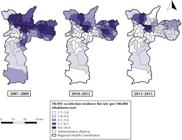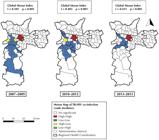ABSTRACT
OBJECTIVE
To describe the spatial and temporal distribution of TB-HIV co-infection, as well as the profile of the characteristics of the co-infected population in the municipality of São Paulo.
METHODS
This is an ecological and time series study with data from the Tuberculosis Patient Control System (TBWeb), including all new cases of tuberculosis co-infected individuals with HIV living in the municipality from 2007 to 2015. Time trends of the disease were analyzed using Prais-Winsten regression. The cases were geocoded by the address of residence for the elaboration of maps with the incidence rates smoothed by the local empirical Bayesian method. The global and local Moran indexes evaluated spatial autocorrelation. Individuals’ profiles were described and the characteristics of the cases with and without fixed residence were compared by Pearson’s chi-square or Fisher’s exact tests.
RESULTS
We analyzed 6,092 new cases of TB-HIV co-infection (5,609 with fixed residence and 483 without fixed residence). The proportion of TB-HIV co-infection ranged from 10.5% to 13.7%, with a drop of 3.0% per year (95%CI -3.4 – -2.6) and was higher in individuals without fixed residence. Incidence rates decreased by 3.6% per year (95%CI -4.4% – -2.7%), declining from 7.0 to 5.3 per 100,000 inhabitants/year. Co-infection showed positive and significant spatial autocorrelation, with heterogeneous spatial pattern and a high-risk cluster in the central region of the municipality. Cure was achieved in 55.5% of cases with fixed residence and in 32.7% of those without a fixed residence.
CONCLUSIONS
The data indicate an important advance in the control of TB-HIV co-infection in the period analyzed. However, we identified areas and populations that were unequally affected by the disease and that should be prioritized in the improvement of actions to prevent and control co-infection.
Tuberculosis; HIV infections, epidemiology; Spatial analysis; Time series studies

 Thumbnail
Thumbnail
 Thumbnail
Thumbnail
 Thumbnail
Thumbnail
 Sources: Tuberculosis Patient Control System (TBWeb, 2017); Fundação Sistema Estadual de Análise de Dados (Seade, 2017).
Sources: Tuberculosis Patient Control System (TBWeb, 2017); Fundação Sistema Estadual de Análise de Dados (Seade, 2017).
 Sources: Coordination of Epidemiology and Information of the Municipal Health Department of São Paulo (CEInfo, 2012); Centro de Estudos da Metrópole (CEM, 2016); Tuberculosis Patient Control System (TBWeb, 2017); Fundação Sistema Estadual de Análise de Dados (Seade, 2017)
Sources: Coordination of Epidemiology and Information of the Municipal Health Department of São Paulo (CEInfo, 2012); Centro de Estudos da Metrópole (CEM, 2016); Tuberculosis Patient Control System (TBWeb, 2017); Fundação Sistema Estadual de Análise de Dados (Seade, 2017)
 Sources: Coordination of Epidemiology and Information of the Municipal Health Department of São Paulo (CEInfo, 2012); Centro de Estudos da Metrópole (CEM, 2016); Tuberculosis Patient Control System (TBWeb, 2017); Fundação Sistema Estadual de Análise de Dados (Seade, 2017)
Sources: Coordination of Epidemiology and Information of the Municipal Health Department of São Paulo (CEInfo, 2012); Centro de Estudos da Metrópole (CEM, 2016); Tuberculosis Patient Control System (TBWeb, 2017); Fundação Sistema Estadual de Análise de Dados (Seade, 2017)